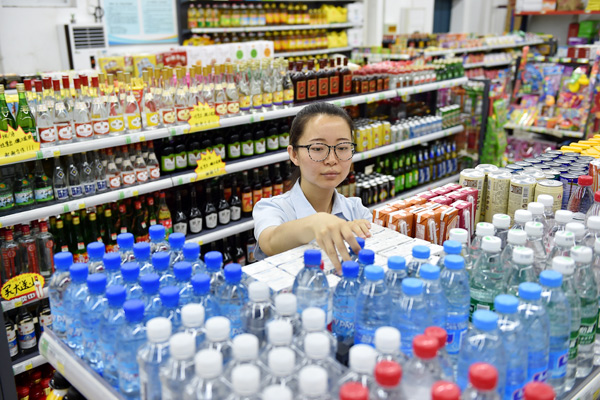Experts call on convenience stores to improve service
 |
|
An employee works at a convenience store in Jincheng city, Shanxi province, Feb 26, 2017. [Photo/Xinhua] |
The number of convenience stores in China is approaching 100,000, generating more than 130 billion yuan ($18.8 billion) in sales in 2016.
To survive the fierce competition, operators of convenience stores should pay more attention to improving their product experience, increase self-owned brands, expand business scope, digitalize their service and optimize the supply chain, said experts.
Based on a survey of convenience stores in China's 36 cities, Vincent Lui, partner and managing director at Boston Consulting Group, said both the store numbers and operating revenue grew substantially in 2016, indicating the great market potential for this special retail business model, but the challenge is not small at all.
"Convenience store chains in China generated 133.4 billion yuan in revenue last year, up 13 percent from 118.1 billion yuan in the previous year. In the meantime, total store numbers also increased 9 percent from 91,000 a year ago to 98,000," said Lui.
"However, many convenience store operators are facing very huge pressure from sales, profit, cost and the competition brought about by online retailers," added Lui.
According to Lui, average rents rose 7 percent last year, and labor costs spiked 6.5 percent during the same period. But the average daily sales of the 40 convenience stores in its sample was merely 4,727 yuan. This was far below the world's largest international convenience store chain 7-Eleven's 25,000 yuan per day in Beijing this summer.
"Visits to many domestic connivance stores give me the impression that many of the stores look alike, and there is huge room for operators to strengthen their branding, management and services," said Wu Zhaosong, general manager of the chain retail division of Shanghai Haiding, a Shanghai-based information engineering company.
In comparison, some well-known convenience stores do better in attracting customers. For example, the products sold in Lawson are 40 percent self-owned, and FamilyMart, a subsidiary of Taiwan-based Ting Hsin International Group, tries to satisfy its customers by adopting state-of-art technology and internet-based service.
Ting Hsin is well-known for its instant noodle and drinks brand Master Kong, or Kangshifu. "1,700 out of the 2,800 products will be replaced on a yearly basis in a FamilyMart store," said Zhu Hongtao, general manager of Shanghai FamilyMart Co Ltd.
"To win favor from customers, more efforts should be made on offering products tailored to target clients' lifestyles, launching more self-owned products, increasing the percentage of fresh food and semi-finished products, offering more value-added service, following the digitalization trend, and building a reasonable and efficient franchise mode," said Lui.
"Consumption at convenience stores is usually spontaneous. Their service is irreplaceable either by traditional stores or e-commerce's same day delivery," said Wang Hongtao, deputy secretary-general of the China Chain Store & Franchise Association.























